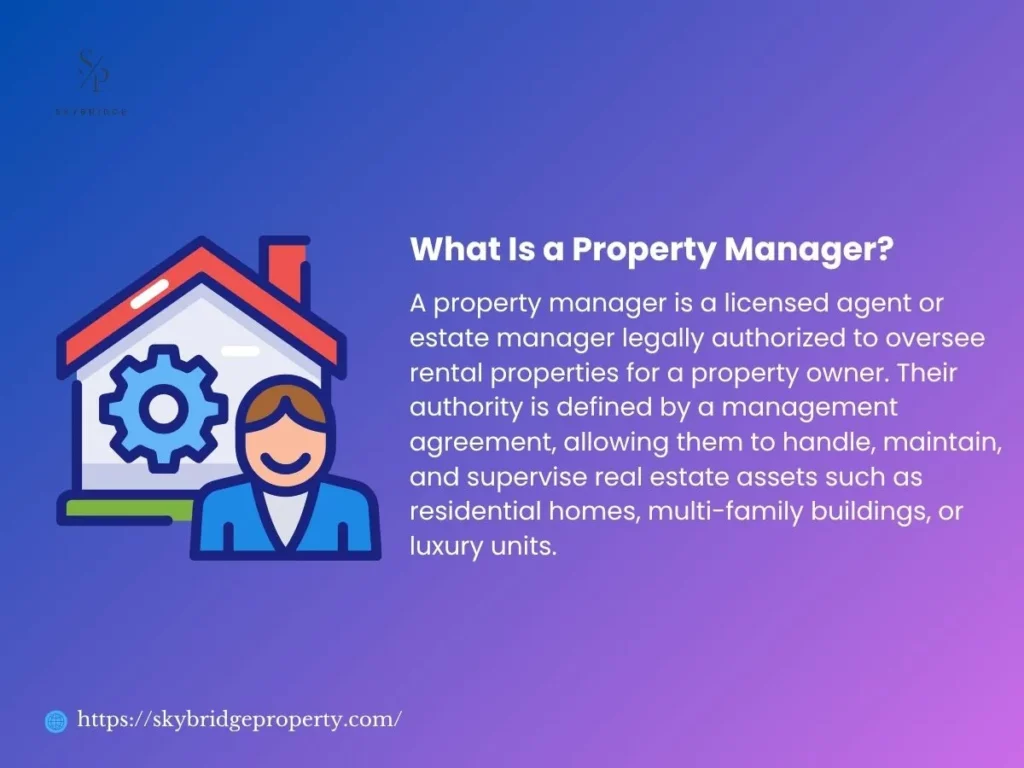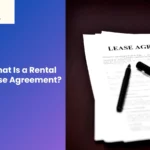A property manager oversees rental properties like single-family homes, multi-family buildings, and luxury residences, ensuring they remain well-maintained, compliant, and profitable for owners. While this role exists nationwide, California’s strict regulations and competitive market highlight its importance.
Core duties include rent collection, tenant communication, maintenance coordination, lease enforcement, and vendor management. Property management companies provide these services to help landlords improve ROI, reduce vacancies, and handle legal complexities. Owners often hire managers when they lack time, local knowledge, or resources.
Hiring a property manager offers operational efficiency and legal protection but involves fees and reduced control. The profession requires specific skills, licensing, and certifications. In dynamic markets like California, property management remains essential to maximizing property value and ensuring regulatory compliance.
What Is a Property Manager?
A property manager is a licensed agent or estate manager legally authorized to oversee rental properties for a property owner. Their authority is defined by a management agreement, allowing them to handle, maintain, and supervise real estate assets such as residential homes, multi-family buildings, or luxury units.
Under the California Department of Real Estate regulations, they act as legal intermediaries tasked with tenant coordination, rent collection, and vendor oversight. According to the DRE, a property manager is “an individual or entity holding a valid real estate license, who engages in the leasing, managing, or collecting of rent for one or more property owners in exchange for compensation.”
They serve tenants by ensuring habitability and lease enforcement, and owners by protecting the asset and improving ROI. For example, a licensed manager handling a 10-unit building in Los Angeles may screen tenants, arrange repairs, and enforce evictions, all while ensuring legal compliance. The need for such roles is growing rapidly, particularly in regulation-heavy, high-rent markets like Southern California.
What Does a Property Manager Do?
A property manager performs daily property oversight and stakeholder coordination with the goal of preserving the property’s condition, ensuring tenant satisfaction, and maximizing ROI for the landlord. This multi-functional role involves direct interaction with both tenants and owners, while maintaining strict adherence to California’s landlord–tenant laws and regulatory requirements.
Below are the 6 core responsibilities of a property manager:
- Rent Collection: Manages payment tracking, issues late notices, and enforces penalties when rent is overdue.
- Maintenance Coordination: Schedules timely repairs, oversees property inspections, and liaises with vendors such as plumbers, electricians, and landscapers.
- Tenant Screening: Evaluates prospective tenants based on background checks, income verification, and credit reports.
- Lease Administration: Prepares legally compliant lease agreements, handles renewals, and processes terminations.
- Eviction Enforcement: Conducts lawful evictions in line with California’s stringent legal procedures.
- Regulatory Compliance: Ensure adherence to HOA policies, local building codes, and fair housing laws.
Click the boxes to check off tasks completed by a property manager. You will see a “Congratulations” message when all tasks are completed.
Congratulations! All tasks are completed.
Pros and Cons of Hiring a Property Manager
Hiring a property manager yields both benefits and risks, making the decision a matter of balancing time, cost, and control. While some landlords prefer the hands-on approach of managing rental properties themselves, others opt to delegate tasks to a licensed agent for better efficiency and compliance. This choice often depends on the owner’s availability, property volume, and familiarity with landlord–tenant laws.
| Pros | Cons |
| Time-saving and operational efficiency | Monthly fee (typically 3–20% of rent) |
| Reduced vacancy and tenant turnover | Less control over day-to-day decisions |
| Expertise in legal and regulatory matters | Risk of mismanagement or poor service |
| Delegation of tenant/vendor coordination | Impersonal tenant relationships |
Owners should evaluate these trade-offs based on their investment strategy. A hands-off investor may prioritize stress-free ownership and ROI stability, while a more engaged landlord might prefer direct oversight and cost savings. The value lies in weighing the time saved and legal protection against the management fee and control loss.
Pros of Hiring a Property Manager
Hiring a property manager provides a range of operational advantages that improve efficiency, legal safety, and tenant satisfaction while allowing property owners to focus on strategic goals.
- Save Time and Costs
A property manager helps reduce vacancy by screening quality tenants quickly, using structured background checks and faster leasing cycles. Their vendor networks allow for negotiated bulk rates, reducing repair costs. Delegating day-to-day operations frees up time and can improve ROI, e.g., shaving two weeks off a vacancy can offset an entire month’s management fee.
- Improve Tenant Relationships
Professional managers offer 24/7 responsiveness, consistent communication, and dispute resolution mechanisms. These services lower tenant turnover and contribute to better online reviews, which in turn attract new renters more efficiently.
- Leverage Expertise and Local Knowledge
With an in-depth understanding of zoning laws, rent control rules, and eviction protocols in California, property managers minimize legal risks. This protects landlords from fines, lawsuits, or non-compliance penalties, making operations smoother and more secure.
- Manage Vendor Relationships
Experienced management companies maintain networks of reliable vendors, from electricians to plumbers, and negotiate discounted service rates. They ensure that maintenance is timely and consistent, relieving owners of the stress of coordinating and monitoring third-party work.
Cons of Hiring a Property Manager
While beneficial in many cases, hiring a property manager can lead to operational limitations that impact profitability, control, and tenant engagement.
- Reduced Profitability
Management fees typically range from 3-20% of monthly rental income, with extra costs for lease-ups, renewals, and repairs. These charges can compress the owner’s profit margin, particularly in smaller portfolios.
- Loss of Control Over Key Decisions
Property managers may approve repairs, accept tenants, or enforce lease clauses without real-time consultation, which can lead to strategic misalignment between owner intent and on-the-ground decisions.
- Risk of Incompetence or Negligence
Poor tenant screening, delayed maintenance, or non-compliance with legal standards can expose landlords to fines or lawsuits. This risk underscores the need to vet the property management company thoroughly.
- Dependence on Third Parties
Outsourced maintenance vendors and contractors may vary in response time and quality. This reliance can affect service consistency and erode the owner’s ability to respond agilely to property issues.
- Impersonal Tenant Relationships
Professional managers may adopt standardized policies that lack personalization. Tenants may feel disconnected from ownership, which can impact loyalty, renewals, and satisfaction levels.
How Much Does Hiring a Property Manager Cost?
Hiring a property manager typically costs 3–20% of the monthly rental income, depending on the property type and scope of services. Multi-family properties usually incur fees around 3%, while single-family homes and luxury properties, needing more hands-on management, can reach up to 20%. Vacation rentals may have higher fees, sometimes up to 50%, due to rapid tenant turnover and intensive management.
Besides the monthly fee, landlords may face one-time setup fees, lease-up charges ($250–$500), renewal fees, and maintenance markups. These reflect added services like tenant screening and vendor coordination. Though these costs affect profits, they often balance out by reducing vacancy periods, avoiding legal issues, and improving tenant retention, leading to stronger, more stable ROI over time.
Estimated Monthly Cost:
Please fill out the form to get an estimate.
Property Manager as a Career
A property manager requires a combination of legal knowledge, customer service skills, and operational oversight to succeed in a field that continues to grow in demand and complexity. For those interested in how to become a property manager, the path typically starts in assistant roles that involve leasing coordination and administrative support. With experience, individuals move into full management positions, eventually advancing to regional or director-level roles that oversee larger portfolios and strategic operations.
The work environment is diverse and includes residential, commercial, HOA, and vacation rental properties. Each day may involve conducting inspections, handling tenant communications, supervising vendors, and ensuring legal compliance. These tasks are supported by management platforms like AppFolio, Buildium, or Yardi, which streamline operations and reporting. The profession’s importance is reinforced by the U.S. Bureau of Labor Statistics, which projects a 3% growth in demand between 2023 and 2033. This trend reflects the growing complexity of rental regulations, increased investor ownership, and the housing density of urban markets, particularly in California.
Compensation reflects both responsibility and specialization. Entry-level roles' annual median pay revolves around $58,335 (ZipRecruiter), while experienced property managers and directors can earn over $115,000, depending on location and property type. Despite the challenges of legal risk, emergency coordination, and tenant disputes, the role offers transferable skills that open career paths into real estate investment, leasing management, and asset oversight.
Skills Required to be a Property Manager
A property manager needs specific skills to handle daily operations, communicate with tenants, and meet legal requirements. These skills directly affect property performance, tenant satisfaction, and compliance, especially in states like California, where regulations are complex and enforcement is strict.
The most important skills include:
- Strong communication for tenant engagement and dispute resolution
- Working knowledge of California rental laws and fair housing regulations
- Organizational skills for scheduling, inspections, and documentation
- Use of property management software like Yardi or AppFolio
- Problem-solving and real-time decision-making under pressure
Each of these supports the manager’s ability to protect the property, meet owner expectations, and keep tenants satisfied.
Certifications Required to be a Property Manager
To legally manage rental properties in California, a property manager must hold a valid Real Estate License from the Department of Real Estate (DRE). While this license is mandatory, earning additional certifications can improve job prospects, increase credibility, and qualify managers for higher-value portfolios.
Key certifications include:
- Certified Property Manager (CPM) – ideal for portfolio-level managers
- Certified Apartment Manager (CAM) – focused on multi-family units
- Accredited Residential Manager (ARM) – specialized for residential properties
These certifications expand career opportunities and often lead to better compensation. Joining professional organizations like IREM or NARPM helps managers stay informed about legal updates and industry standards.
How Long Does It Take to Be a Property Manager?
It takes at least 135 hours of pre-licensing education to become a property manager. According to the DRE, applicants must complete three college-level courses, each with a minimum of 45 hours. This includes courses in real estate principles, practice, and a related elective.
After finishing the coursework, candidates must pass the California Real Estate Salesperson Exam, which includes a background check and fingerprinting as part of the DRE process. Scheduling and processing the exam and license can take several weeks to a few months. Optional certifications and apprenticeships may add time but help build practical experience.
Who Should Hire a Property Manager?
Property owners who lack time, local presence, or expertise should hire a property manager to ensure efficient and compliant property operations. The decision depends on factors like owner type, availability, legal knowledge, and the size of the property portfolio.
Ideal candidates for hiring a property manager include:
| Owner Profile | Location | Property Type | Management Goals |
| Out-of-State Owners | Any (e.g., Los Angeles) | Single-family, Multi-family | Need local oversight for maintenance and emergencies |
| Busy Professionals | Urban areas like Pomona, Diamond Bar | Rental homes, Apartments | Delegate daily tenant communication and lease management |
| Portfolio Investors | Multiple cities (e.g., Rowland Heights, La Puente) | Multi-unit buildings | Require scalable and organized management systems |
| Luxury Property Owners | High-end neighborhoods | Luxury residences | Demand premium tenant services and reputation protection |
| First-Time Landlords | Various | Single-family homes | Seek guidance on legal compliance and tenant screening |
Given these profiles, hiring a property manager is ultimately a strategic decision focused on balancing ROI and peace of mind over simple cost considerations. Property owners should perform a thorough time-versus-cost audit and carefully vet potential management companies to ensure a good fit.
Get a Quote from Skybridge Property Group
Skybridge Property Group is a trusted provider managing properties in key California markets, including:
Our Key Service Areas:
Ready to get started? Fill out the form below for a quick quote and consultation, or contact us for more information.







